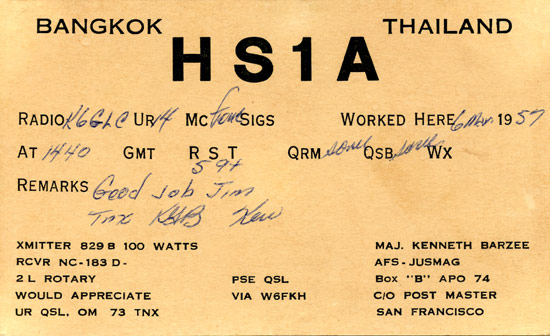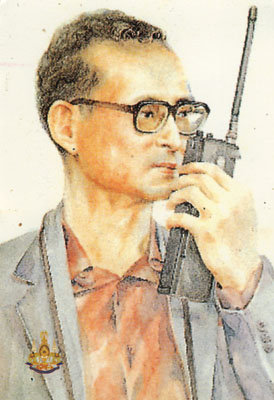

HS1A 1957 Thailand

King of Thailand Bhumiphol Adulayadej is
HS1A
HS1A appeared in 1957, just after one of the Thailand bans was lifted. The operator was a USAF Major, Ken Barzee, who was previously living in my neighborhood while stationed at Norton Air Force Base in San Bernardino. He was active for a short period, followed soon afterward by HS1B and HS1C, who were both very active on CW. W6YA
Since I didn't get to Thailand until 1968, I'm not well informed about what went on before that either. I did collect a lot of documents before I first went to Thailand in 1968, but when I left in 1970 I never expected to be assigned there again so I gave the documents to old-timer Jamnong Suwanna, HS1JN, a Thai Navy Captain, figuring he would turn them over to the club, which he never did, and he died a few years ago without anyone knowing what happened to the documents.
My understanding is that the first HS1A, HS1B and HS1C never had licenses as such. They were given oral permission to operate by senior Thai military officers as a courtesy which could be denied at any time since no written documents were involved. Only a couple of Thai citizens were active at the same time as the Thai military considered Amateur Radio to be subversive, and the Thai PTD was worried about Thai ethnic Chinese using Amateur Radio for illegal commerce with Hong Kong; they had good reason for their suspicions since that had already happened. Jonas Eddy, HS1SD, an ethnic Chinese who had used his radio skills to assist the loyal Thai underground to resist the Japanese occupiers during WW II, was one of the few who was able to operate with the full knowledge of Thai officials. Sangiem Powtongsook, HS1PJ (sometimes operating as HS1BJ), the first known Thai ham who started up in the 1930's when he was a PTD official, was reported to use every chance he got to scare Thai officials to the effect that ham radio was subversive because he wanted to be the only ham in Thailand.
It's true that Thailand got itself on the banned list the second time by accident. Thanks to research by Don Riebhoff and myself, we were able to get a copy from ITU official Ted Robinson, F8RU of the document that had caused Thailand to be placed on the banned list. It was a questionnaire consisting of about 50 questions, in the French language, which was circulated periodically by the ITU to its member national administrations. Only one of the questions was about the Amateur Radio Service, and it read something to the effect of: "Do you prohibit your Radio Amateur licensees from communicating with Amateur Radio stations in other countries?", meaning that if you answered in the affirmative you put yourself on the banned list. Whoever had answered on behalf of the Thai PTD answered "oui" to every question. When we showed a copy of this document to Deputy Director of the Thai PTD Sribhumi Sukhanetr, HS1SS, he telexed ITU HQ that the Thai administration no longer made such a prohibition and the ITU took Thailand off the banned list. But Sribhumi was not powerful enough to push through a reciprocal operating agreement with the USA at that time, because his efforts to do so were squelched by the Minister of Communications, a Thai Air Force General. I asked my big boss at the Embassy to go around and talk to the General about this, which he did, but the General was insistent that, while American Embassy hams could continue to operate informally without having to worry about being shut down by Thai authorities, the Thai Government would never issue a piece of paper formally granting that permission. As a result, RAST President Thai Army General Kamchai Chotikul, HS1WR drew up a beautiful "official" membership certificate for RAST members which looked enough like an official Thai government document so that a local cop called in by a ham's neighbors because of RFI might be impressed enough to back off when he saw the certificate on a ham's wall.
Later on when Don Riebhoff and I
ended up in Viet Nam at the same time, we found Viet Nam on the
banned list also. When State Department Radio Tech
"Chester" Lunsford, W4EVG, custodian of XV5AC which had
been issued to Ambassador Ellsworth Bunker so he could talk
through 9N1MM to his wife who was our Ambassador to Nepal, took
the copy of the ITU "banned list" document to
Washington and showed it to FCC Chief Engineer Ray Spence, W4QAW,
Ray abolished the banned list altogether for US hams.
73, Fred, K3ZO
HS1A, Thai King Bhumibol Adulyadej became a Silent Key on October 13, 2016. He was 88 years old. Fred Laun K3ZO/HS0ZAR (ex HS1ABD), said HS1A "wasn't very active on the air, and to my knowledge the only QSO's he ever made were from a handheld on 2 meter FM". HS1A was often "pictured with a handheld". His Majesty granted Royal Patronage to the Radio Amateur Society of Thailand (RAST), the country's IARU society. Fred also said Princess Maha Chakri Sirindhorn, the second daughter of the late King, is another member of the Thai Royal Family and is HS1D.
QSL & Info W6YA Collection
Photo sketch & Info courtesy of K3ZO